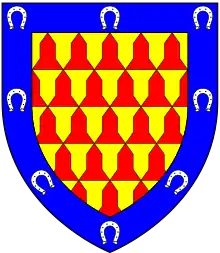
Arms of William de Ferrers of Groby (as also used by his father William de Ferrers, 5th Earl of Derby): Vairy or and gules, a bordure azure (or sable) charged with eight horseshoes argent[1]
William de Ferrers (1240-1287) of Groby Castle in Leicestershire was the younger son of William de Ferrers, 5th Earl of Derby (c.1193-1254) of Chartley Castle in Staffordshire, by his second wife Margaret de Quincy, daughter and heiress of Roger de Quincy, 2nd Earl of Winchester (c.1195-1264). He founded the line of Ferrers of Groby, having been given Groby Castle by his mother Margaret de Quincy.[2] Having rebelled against King Henry III, he was taken prisoner at the Battle of Northampton in 1264, but was later pardoned.[3] In 1282 He was with King Edward I in the Army of Wales.
Marriages & issue
He married twice:
- Firstly, Anne, whose identity is uncertain, possibly a daughter of Hugh le Despenser, Justiciar of England by his wife Aline Basset (per The Complete Peerage), or of Alan Durward and Margery of Scotland, (per Oxford Dictionary of National Biography).[4] By his first wife he had issue:
- William Ferrers, 1st Baron Ferrers of Groby (1272-1325), who adopted the arms of his paternal grand-mother de Quincy, in lieu of his paternal arms (Vairy or and gules).[5]
- Secondly he married Alianore de Lovaine (d.post 1326), a daughter of Matthew de Lovaine,[6] feudal baron of Little Easton in Essex.[7] After Ferrers' death she was abducted in 1289 and married by Sir William de Duglas (d.1299), who was imprisoned for his action. She married thirdly , before 1305, Sir William Bagot of Hide and Patshull in Staffordshire, whom she survived, and was buried in Dunmow Priory in Essex. Her surviving seal displays the arms of her first husband: Vairy, a bordure charged with horse shoes.[8]
References
- ↑ Cokayne, G. E.; Gibbs, Vicary & Doubleday, H. A., eds. (1926). The Complete Peerage of England, Scotland, Ireland, Great Britain and the United Kingdom, extant, extinct or dormant (Eardley of Spalding to Goojerat). 5 (2nd ed.). London, p.340, note (d)
- ↑ G. E. Cokayne, The Complete Peerage, n.s., vol.5, pp.340-2
- ↑ G. E. Cokayne, The Complete Peerage, n.s., vol.5, pp.340-1
- ↑ "Ferrers, William (C. 1240–1287)". Oxford Dictionary of National Biography (online ed.). Oxford University Press. 2004. doi:10.1093/ref:odnb/65399. (Subscription or UK public library membership required.)
- ↑ G. E. Cokayne, The Complete Peerage, n.s., vol.5, p.343, note (c)
- ↑ G. E. Cokayne, The Complete Peerage, n.s., vol.5, p.341
- ↑ Sanders, I.J. English Baronies: A Study of their Origin and Descent 1086-1327, Oxford, 1960, p.130
- ↑ G. E. Cokayne, The Complete Peerage, n.s., vol.5, p.342, note (e)
This article is issued from Wikipedia. The text is licensed under Creative Commons - Attribution - Sharealike. Additional terms may apply for the media files.